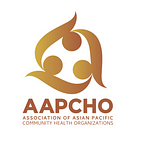Meet the Team: Joe Lee, MSHA, Training and Technical Assistance Director
Welcome to our blog series, “Meet the AAPCHO Team,” where you’ll have a chance to get to know our staff! For the first of our series, meet Joe Lee, our new Traning and Technical Assistance Director, as he answers a few questions!
What’s your role at AAPCHO?
My role at AAPCHO is Training and Technical Assistance (T/TA) Director, where I oversee national training, technical assistance, and consulting activities with our member health centers and partner organizations. I’m principally responsible for program development, planning, monitoring, operations, and evaluation work related to AAPCHO’s National Cooperative Agreement with the Bureau of Primary Health Care and T/TA related contracts. My personal mission is to help others develop the tools and resources they need to effect meaningful change.
What are some Asian American, Native Hawaiian, or Pacific Islander health topics that you think people should know about?
One Asian American, Native Hawaiian, or Pacific Islander (AANHPI) health topic that people should know about is gender-based violence, which is defined as any act that results in physical, sexual, or psychological harm or suffering to women, including threats of such acts, coercion or arbitrary deprivations of liberty, whether occurring in public or in private life (Asian Pacific Institute on Gender-Based Violence, 2018). Did you know? 21–55% of Asian women in the U.S. report experiencing intimate physical and/or sexual violence during their lifetime (Yoshihama & Dabby, 2015). To learn more, follow @apigbv on Twitter.
The second AANHPI health topic is the lack of mental health service utilization. Did you know? Compared to other racial and ethnic groups, Asian adults had the lowest percentage of outpatient service and prescription medication use (SAMHSA, 2015). According to SAMHSA, AAPIs are less likely to reach out for help than other races and ethnic groups due to faith and religious beliefs, cultural values, and language barriers. To learn more, check out SAMHSA’s resource on AANHPI behavioral health equity.
How would you describe what community health centers do and why they should support them to someone who may not be familiar with them?
I would describe community health centers as innovative healthcare providers that provide holistic and integrative primary care, behavioral health, and dental services. I’ve witnessed patients come to community health centers to learn how to cook healthy recipes and eat better; network with new mothers and fathers to seek best postpartum care practices; sweat away stress through Zumba, restorative yoga, and Tai Chi classes; express themselves through spoken-word poetry in group counseling; be connected with nature through walking groups; and volunteer to give back to their own community. Community health centers do much more than just treating medical conditions. They focus on increasing people’s happiness, improving quality of life, and serving as true healers for local communities.
What are you most looking forward to in this new year at AAPCHO?
As a new employee, I look forward to getting to know my fellow colleagues at AAPCHO and developing synergistic collaboration opportunities across all departments. I’d love to learn everyone’s “personal mission statement” and inspiration for joining AAPCHO. I feel excited to be part of a mission-driven national association that focuses on elevating the meaningful work of our community health centers.
What is your favorite or go-to childhood comfort food?
Dolsot bibimbap!
